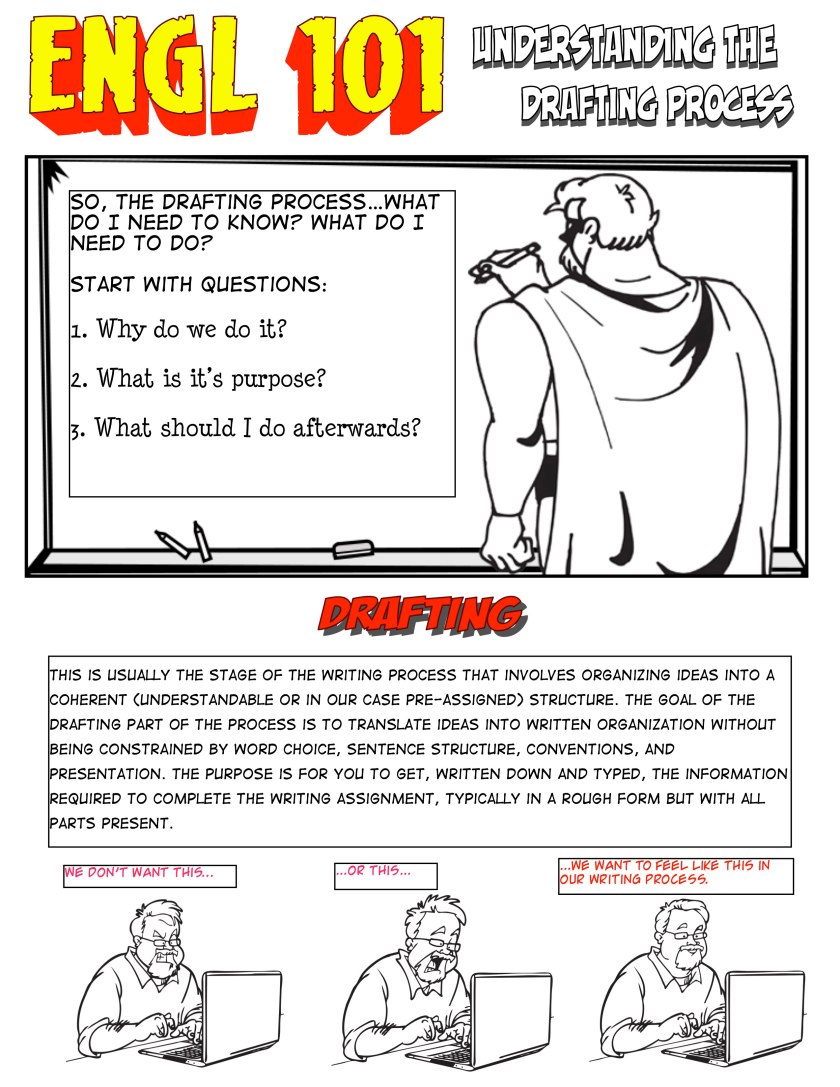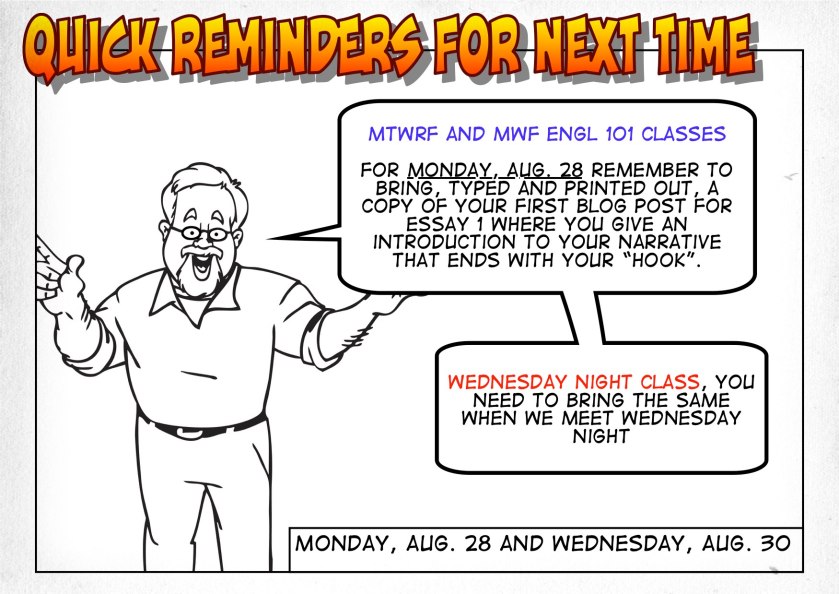Take a moment to read this below, its part of the rationale I have for why I approach writing and composition the way I am approaching it with you in this class.
Let us discuss this more on Monday
In his book, Supergods: What Masked Vigilantes, Miraculous Mutants, and A Sun God from Smallville Can Teach Us About Being Human, Grant Morrison talks about that when he was growing up near a nuclear sub bases in Scotland of how he was afraid of the nuclear bomb. He goes on to note that like anything else, before it was “real” the nuclear bomb was originally an idea. This was and is the same thing with Superman. He states that
It’s not that I needed Superman to be “real,” I just needed him to be more real than the Idea of the Bomb that ravaged my dreams. [He was] the human imagination, such a perfectly designed emblem of our highest, kindest, wisest, toughest selves, that my Idea of the Bomb had no defense against him… (xv)
Morrison speaks of a truth here that I too believe in. Superheroes are our ideas given form, they represent our “very best” selves, our ideals that though we think are unattainable, are in fact, never out of the question worth reaching for. Superheroes, like our mythologies and imaginations, are worthy of exploration because they inspire in us to be our better selves, to achieve great things, and believe in a better world.
Still, someone might rightly ask: Just what role do superheroes play in our world today?
Comic books, particularly as scholarship, are as a reflection of the multiplicity of humanity. Superheroes are an exploration of the human condition. For as humanity is itself a complex systems of values and ideas, so to, as Henry Jenkins points out:
that it [comic book superheroes] has maintained the capacity to build upon that varied history by pulling towards one or another genre tradition at various points in its development; that it has maintained its dominance over the comics medium by constantly absorbing and appropriating new generic materials; and that its best creators have remained acutely aware of this generic instability, shifting its core meanings and interpretations to allow for new symbolic clusters… (Henryjenkins.org)
Superhero comics are able to draw upon, to appropriate, whatever is needed – genre, form, idea, etc. – to explore whatever facet of the human condition any writer, artist, or fanboy could want. They are the new mythology of the modern age.
The ideals that are found in comic books and comic book superheroes are most often American ideals. However, to what shape those ideals are portrayed are sometimes called into questions. Two articles, one actually from a book, tackle this idea from two different approaches. The first, a chapter from a book entitled Introducing Comics and Ideology by Matthew McAllister, Edward Sewell, and Ian Gordon, looks at how the portrayal of ideology in comic books has been misinterpreted or viewed as a threat to American ideology and beliefs. The second, “What Makes Superman So Darned American?” by Gary Engle, looks to more of the idealistic trope of how superheroes are part of the American cultural “consciousness.”
McAllister, Sewell, and Gordon’s article tackles what started comic book superheroes “darkest night” when they came under attack by psychologist Fredric Wertham’s 1954 book Seduction of the Innocent. Wertham’s book attacked comic books as the cause of delinquent behavior, homosexuality, and other socially unacceptable behaviors in youth by acknowledging the power comic books had as a medium to influence young people. This, in some cases, was not untrue. The authors note though “By attacking all comics with such a broad stroke, Wertham also missed more subtle textual and interpretative cues that actually critiqued dominant institutions rather than celebrated the status quo…” (6). Wertham missed out on the fact that comic books both challenge and reinforce, through hegemony, the ideologies in which they are created. He was right that comic books had power to influence young minds and shape their views; however, he missed the “boat” by not seeing the positive influences that comic books and comic book superheroes could have to teach young adults and kids. Wertham’s narrow view and broad strokes represented a missed opportunity and one that comic books has paid for ever since in many respects.
Gary Engle’s article, “What Makes Superman So Darned American?” takes up where Wertham left off and missed out. This article discusses just how powerful a semiotic icon figures, like Superman in particular, really are and how they embody American ideology. Engle boldly states that “Superman is the great American hero…achiev[ing] mythic stature, interweaving a pattern of beliefs, literary conventions, and cultural traditions of the American people” in a way that other American heroes of myth and folklore cannot (1). Superman does all this and the fact remains that he is not an American by birth – he’s an illegal alien. Not just any illegal alien either; he’s an alien illegal alien from another planet. It’s still American though, because we are a nation of immigrants. Not only does this make Superman “So Darned American” but it also engages in creating something greater – a debate.
Superheroes are also allegories, metaphors, and representations of ideas and conflicts that persist in the world around us today – as in the past and probably the future too. Superman is American because he is able to be a “cultural icon” that “manages to tap the national religious spirit” but in a way that is secular but more than secular at the same time (8). He defies religion and secularism to become something both camps can see as an embodiment of “more” and “what is best” to strive for – such is the role of a symbol and icon anyway.
Superheroes can be whatever we want them to be and are only limited by the potential of human’s to tell stories. To say that superheroes are not worthy of study is to say Homer, Shakespeare, Dante, and Hemingway are of dubious nature as well because their stories had superheroes of their own. Superheroes are part of an expression of the human experience.
There is always a place for stories in the human experience; to say otherwise is a kin to denying human nature – though we do it all the time. To return to Grant Morrison’s book, which says so much about how American comic book superheroes are, but also how superheroes can belong to any cultural expression. Morrison states that humanity, we as humans,
We live in the stories we tell ourselves. In a secular, scientific rational culture lacking in any convincing spiritual leadership, superhero stories speak loudly and boldly to our greatest fears, deepest longings, and highest aspirations. They’re not afraid to be hopeful, not embarrassed to be optimistic, and utterly fearless in the dark…We should listen to what they have to tell us. (xvii)
We should listen to what they have to tell us. Our culture spends far too much time either attempting to look “progressive” or “conservative” without acknowledging we need both. In fact, we constantly want both and desire both, we re-appropriate (and always have) elements of the past, reworking them and shaping them to use again in the present. Superheroes are a re-appropriation of our myths and ancient stories, given a chance to live again in the present. Why? Because we need them to do so to remind us of where we have been, what we believe in, what we want, and how nothing is beyond the human spirit to achieve. Superman’s greatest role, as Morrison illustrated in All-Star Superman, is to inspire and lift up humanity. As Marlon Brando, portraying Superman’s father Jor-el, stated in reference to humanity that “They can be a great people, Kal-El, they wish to be. They only lack the light to show the way” (Superman: the Movie). Human potential is limited only by our imaginations. We dreamed up Superman, Iron Man, Batman, Galactus, the Fantastic Four, Spiderman, Captain America, and Wonder Woman. Why should there be any limit at all? That is why comic books matter, because of the limitless possibility of the human imagination that they represent.
Works Cited
Engle, Gary. “What Makes Superman So Darned American?” Mythic Rhetoric of the American Superhero. Reading Packet. Com 4849: Special Topics in Rhetorical Studies. Dr. Shaun Treat. 2011. Print.
Jenkins, Henry. “Just Men in Tights.” Henryjenkins.org. Confessions of an Aca-Fan. 19 March 2007. Web. 10 Oct. 2011.
McAllister, Matthew P., Edward H. Sewell, and Ian Gordon. Introducing Comics and Ideology. New York: Peter Lang, 2001. Print.
Morrison, Grant. Supergods: What Masked Vigilantes, Miraculous Mutants, and A Sun God from Smallville Can Teach Us About Being Human. New York: Spiegel & Grau, 2011. Print.












